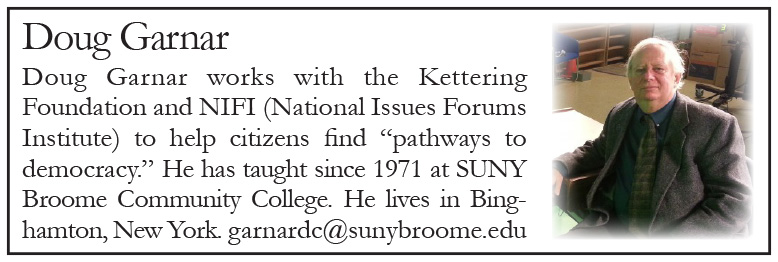The Issue of Policing: A Draft NIFI Publication for Community Deliberation
Pathways to Democracy
- DOUG GARNAR –
“I have a dream that my four little children will one day live in a nation where they will not be judged by the color of their skin but by the content of their character.”
– Martin Luther King. Jr.—1963, I have a Dream Speech
This past summer the killings of George Floyd, Breonna Taylor and Rayshard Brooks—all in a long string of killings by police officers—led to massive demonstrations by citizens of all colors voicing their concerns about the unjust treatment of racial minorities.
Now, the majority of American citizens, including police chiefs and police officers, are calling for change. The Federal government has taken some steps for review and reform. But major decisions will have to be made at the state and local levels. Making such decisions would be best served by thoughtful deliberative discussion involving a wide spectrum of community members, elected officials, law enforcement professionals, people of color, and others.

While communities differ, nearly all of them face complex questions including the following:
•What kinds of changes would make our communities safer and more just for everyone?
•What law enforcement functions do we value and want to enhance and what ones do we wish to change?
•How can we enable local police depts. to provide adequate training, transparency and accountability to serve all members of the community equitably and well?
•How can some community issues be handled without involving law enforcement and how can we be sure that these alternatives are reliable, effective and practical?
What follows is a “draft” publication by the National Issues Forums Institute (nifi.org). The hope is that interested communities would use the following deliberation to promote a major conversation on the issue of policing. NIFI has developed a three-option approach to start the conversation. But it is important to understand that it can be modified as a community sees fit.
The three options include:
OPTION ONE–Increase Accountability
This option argues that a law-abiding community needs police who are well-trained, thoughtful, and accountable, and who do not rely exclusively on force and intimidation. To do so requires a rethinking of how police are hired, trained, supervised, and disciplined. Consider the following actions:
•Officers who fail to report suspected police misconduct should be fired and those who do should be promoted.
•End access to military grade weaponry.
•Make police disciplinary records available in a public database so journalists and citizens have access to them and that officers with repeated offenses will not be hired elsewhere.
•Create diverse, multiracial and independent review boards that can investigate complaints from the public and recommend that an officer be disciplined or removed if warranted.
As with all NIFI forums, drawbacks are provided for each action.
A primary drawback of this option is that many of these reforms have been tried in the past with little success. Unless we understand the effects of racism in law enforcement and significantly reduce police department responsibilities, abusive policing will continue.
OPTION TWO–Confront Persistent Racial Discrimination in Policing
This option argues that law enforcement agencies, like other institutions reflect a long history of constant racial injustice/discrimination. Police behaviors suspecting minority groups are not just the behavior of a few rogue law enforcement people. We must recognize widespread racial discrimination and biased thinking among police. Consider the following:
•Transform police education to put less training on the use of weapons and more focus on understanding the impact of racial prejudice and underlying problems facing a community the police serve.
•Reorganize police departments and make all officers reapply to serve in new precincts focused on non-violent/unbiased law enforcement.
•Stiffen police recruiting requirements and conduct extensive background checks to weed applicants with a history of racial bias.
•Require officers to live in the communities they serve so they develop strong ties with the residents.
•Establish truth/reconciliation commissions to conduct open public hearings that expose instances of police abuse/discrimination and which provide police officers and victims an opportunity to talk together to find a better path forward.
This guide includes counterpoints for each action.
A major drawback of this option is that while we should fire officers who abuse and mistreat citizens, we should not assume all officers are racists. By stereotyping all officers, we alienate those who are well-intentioned and want to work with communities to end misconduct and reform policing practices.
OPTION THREE–De-Escalate to Create New Responses to Nonviolent Problems
Nonpartisan policy institutes and national newspapers have found more than ever that the vast majority of police work does not deal with traditional crime/violence; rather it deals with a whole host of social problems ranging from mental health crisis, drug abuse cases, to domestic disputes. This approach argues that such social problems should be dealt with by skilled community members, wellness and health professionals, and social services. Consider the following:
•Provide more counseling for police and first responders to help them handle the pressures of their work.
•Move truancy back to the schools.
•Move domestic abuse cases from law enforcement to special family counselors and courts.
•In first response practices include social workers, mental health/drug counselors to help ward off a rapid escalation scenario.
•Expand neighborhood watch programs that help communities protect themselves.
Counterpoints for each action are offered.
A primary drawback of this option is that often mental health, drug-related, and domestic disputes may lead to violence; counseling does not always work. Communities might be subject to more disorderly conduct, schools would be less safe and, as a result, there would be an increase in illegal drug use and petty crime.
In the early part of the 20th century, the American educational philosopher, John Dewey argued among other things that all education should be focused on creating engaged citizens. Dr. David Mathews, chair of the Kettering Foundation (kettering.org) has argued that democracy at its core is “problem solving: with engaged citizens being the major catalyst.” I am hopeful that some of the readers of the Owl Light News, might consider promoting in their local communities a deliberative conversation using the aforementioned draft on policing.
The pandemic makes this a daunting task, but the use of Zoom can be a great venue option. Invitations to such a deliberation would include a spectrum of local citizens: police, elected officials, not for profits who deal with societal problems, representative minorities, people from various faith communities, young people, individuals impacted by the criminal justice system and by crime, the chamber of commerce, etc. The goal would be a wide cross section of people. A moderator/timekeeper/recorder are also needed. NIFI and Kettering would greatly appreciate hearing the results of such community forums, and are available to assist.
Finally, a book well worth reading on this complicated issue is Rosa Brooks’ new book, Tangled Up in Blue. Ms. Brooks has a law degree and was a tenured university professor who left her position to become a police officer. Her book is an amazing description of a difficult problem in our society and she offers some glimmers of hope.
